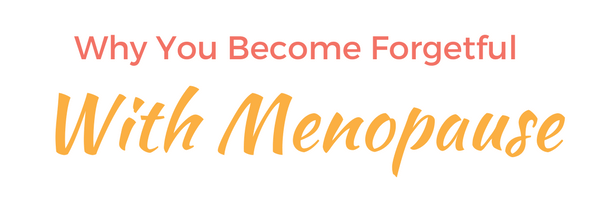
For all women, the menopausal transition can be a distressing time.
As if symptoms like hot flashes, insomnia, mood swings and weight gain are not enough, you can sometimes get the feeling that you’re losing your mind.
The key here should you start to experience any kind of issues with your memory is not to panic…
Don’t immediately assume the worst and fear that you’re suffering from the onset of dementia or Alzheimer’s. (1)
Let’s look briefly at why it’s perfectly natural to become forgetful, especially during the period of perimenopause. We’ll show you what hormonal changes are at play causing this forgetfulness and we’ll look at how you can enhance your memory the easy way. (2)
Perhaps most importantly, you’ll finish up being reassured that you’re probably just going through a stage in the change of life that will soon be left behind you.
What Is Brain Fog?

First thing’s first, you’ll often hear the expression brain fog used to describe the symptoms of forgetfulness that can accompany perimenopause.
Some of the most common manifestations of brain fog are as follows: (3)
- Issues with concentration
- A tendency to forget things
- Slowed-down thought processes
- Hazy and fuzzy feeling
- Problems dealing with new information
Since these symptoms so closely resemble the age-related cognitive impairment of Alzheimer’s, it’s perfectly normal to feel concerned. (4)
Brain fog affects your verbal learning skills along with your working memory. This explains why focus and information processing are negatively impacted at the same time as you experience an increased tendency to forgetfulness with menopause. (5)
Why does this tiresome assault on your memory during the change take place?
The Hormones at Play That Cause Memory Loss
Studies like one at University of Rochester Medical Center show mixed findings.
While hormonal changes during menopause could not be directly linked to cognitive impairment, these fluctuating levels certainly play a part in forgetfulness with menopause. (6)
Why is this?
Your ovaries produce a hormone called estradiol, a type of estrogen. This hormone plays a critical role in both memory and learning. (7)
As you know, during menopause, your levels of estrogen go into freefall as your ovaries start shutting down. (8)
Estrogen is also pivotal in promoting the growth of fresh brain cells so these plummeting estrogen levels present a double-pronged assault on the memory front. (9)
While estrogen has its hand in memory impairment during the menopause transition, reduced levels of progesterone and testosterone are also firmly linked to weakened cognitive functioning and impaired memory. (10) (11)
So…
Now you have an idea of why you become forgetful with menopause, particularly during that run-in period of perimenopause. What can you do to arrest this troubling state of affairs?

How To Increase Your Memory
While you might expect hormone replacement therapy would naturally counter memory loss by helping regulate estrogen levels, this is by no means a certainty.
Even if you are open to the idea of undertaking HRT, the jury’s out on whether or not it’s beneficial for forgetfulness with menopause. (12)
While you should relax and accept these symptoms of brain fog for what they are, that doesn’t help with the frustration. There are several quick and completely natural approaches to giving your brain the exercise it needs.
Here are 6 of the best ways to fight back against becoming forgetful during menopause…
- Exercise For a Natural Boost: Exercising is important during menopause for a range of health reasons not least of which being its ability to improve both your memory and thinking skills. Some light aerobic exercise can work wonders so remain as active as you can. (13)
- Prioritize Sleep: Research shows that sleep is fundamental to proper memory functioning. Shoot for 7 to 9 hours a night and you might be surprised at how much better you feel mentally as well as physically. (14)
- Think About Your Diet: Eating well during the change is super-important for your whole body health. Avoiding processed foods and loading up on oily fish rich in Omega-3 fatty acids can work wonders for your brain. (15)
- Avoid Drinking Alcohol to Excess: While a relaxing glass of red wine can be beneficial, too much alcohol impairs your memory. Keep your consumption within reasonable limits and you’ll be sharper as well as healthier. (16)
- De-stress and Relax: We know, we know, menopause is a stressful time. By effectively managing your stress, though, you can lower the cortisol levels in your body and stop yourself from getting worked up about forgetting what you went upstairs looking for in the first place. (17)
- Give Your Brain a Workout: Last but not least, stay mentally alert. Whether you want to try your hand at a crossword puzzle, read something challenging or play the computer, keep your brain active and you’ll notice a shower of benefits.
This Is Just a Stage
To wrap up on a positive note, there’s one thing to bear very firmly in mind…
forgetfulness in menopause is simply a stage during what’s already a very volatile change in life.
Not only will these symptoms not last, whether they linger for 6 months or a few years, there’s no risk of ongoing damage so you can relax and just focus on improving your memory as best you can! (18)

References
- https://www.alzinfo.org/articles/forgetful-dementia/
- https://www.huffingtonpost.com/maddisen-k-krown/perimenopause-memory-loss_b_834843.html
- https://www.menopausecentre.com.au/information-centre/articles/menopause-and-memory-loss-the-facts-about-brain-fog/
- https://www.ncbi.nlm.nih.gov/pubmed/23576989
- https://www.medicalnewstoday.com/articles/243053.php
- http://www.dailymail.co.uk/health/article-2256675/Does-menopause-really-make-forgetful-Yes-long-say-scientists.html
- https://www.ncbi.nlm.nih.gov/pubmed/9799625
- https://www.mayoclinic.org/diseases-conditions/menopause/symptoms-causes/syc-20353397
- https://www.ncbi.nlm.nih.gov/pmc/articles/PMC3185244/
- https://www.ncbi.nlm.nih.gov/pubmed/25434881
- https://www.sciencedaily.com/releases/2013/06/130617142043.htm
- https://www.healthline.com/health/menopause/memory-alzheimers#3
- https://www.health.harvard.edu/blog/regular-exercise-changes-brain-improve-memory-thinking-skills-201404097110
- http://healthysleep.med.harvard.edu/healthy/matters/benefits-of-sleep/learning-memory
- https://bebrainfit.com/omega-3-fats-brain-benefits/
- https://pubs.niaaa.nih.gov/publications/aa63/aa63.htm
- https://www.optimallivingdynamics.com/blog/20-proven-ways-to-effectively-lower-your-stress-hormone-reduce-counteract-manage-cortisol-decrease-levels-for-brain-mental-health-anxiety-depression-cognitive-function-foods-nutrients-herbs-supplements-adaptogens-adrenals-naturally-tips
- https://www.avogel.co.uk/health/menopause/videos/loss-of-memory-poor-concentration-and-brain-fog/




1 Comment
Pingback: In a Flash - Chapter 2 - Vergo Woman